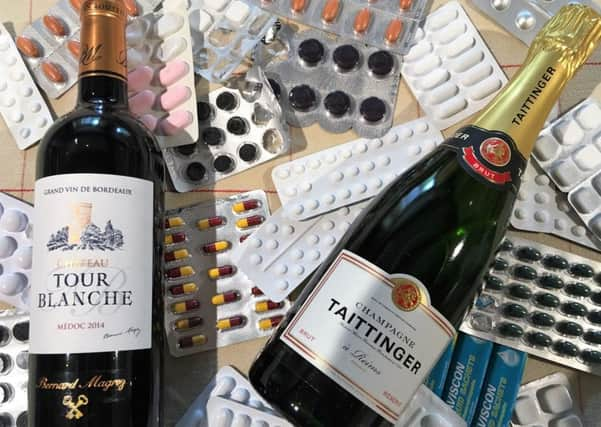RICHARD ESLING: The pros and cons of a glass of wine


But before you go out and empty the shelves of your local wine store, a word of warning.
There have been many studies over the years that have reported the benefits of wine, but there have been just as many reports of the dangers. Hardly a month goes by without someone saying that wine is good for the heart, the arteries, preventing diabetes, improving memory and a whole host of other health improvements.
Advertisement
Hide AdAdvertisement
Hide AdWho funds some of these studies is a question that needs to be asked. But there is no getting away from the fact that one of the main constituents of wine, namely alcohol, can be harmful to the body, depending, of course, on the quantity consumed.
And therein lies the crux of the matter. Moderation. The most harmful effects of alcohol are through drinking to excess and both binge drinking and alcoholism are hugely detrimental to the body. Things perhaps we all know, but at what point do we become dependent on alcohol – the definition of alcoholism – when we must have that glass of wine, or two, every evening?
The report cited above came from the University of California San Diego School of Medicine. It does, however, need to be taken in context, as with all the studies purporting the physical health benefits of wine. The moderate wine drinkers were, and are, from a socio-economic group that has better healthcare, better diet and generally a healthier lifestyle, and it may be this that has the effect on longevity and prolonged cognitive ability rather than anything to do with the wine. As an erstwhile biological scientist, I have to concur.
The term moderate in terms of wine consumption needs some definition. For the majority of studies, this is taken as around two normal glasses per day for men and one for women. The amount is lower for women than for men, since women absorb alcohol more rapidly than men due to the lower body water content and differences in stomach enzymes. The recent change in advice from the UK government on drinking guidelines, where the amount for men was lowered to be the same as for women is thus fundamentally flawed from a scientific viewpoint. Long live the Nanny State.
Advertisement
Hide AdAdvertisement
Hide AdIn essence, there are two general effects from moderate wine drinking. There are the physical effects, but there are also the undeniable mental or psychological effects. These are perhaps seen more in terms of a feeling of well-being, of relaxation and pure enjoyment and can be a real factor in terms of overall health. A team of scientists from several universities in Spain reported that drinking wine may reduce the risk of depression, even after taking account of lifestyle factors.
There are many proponents of the beneficial effects of wine on health, particularly red wine. In France, rather than taking a bunch of grapes when visiting a patient in hospital, it is much more likely it will be fermented grapes, i.e. a decent bottle of red wine to aid recovery. One of the beneficial components in red wine is thought to be resveratrol, which has anti-ageing properties. Another compound called procyanadin may keep the blood vessels healthy, while others could reduce the risk of colon cancer, breast cancer and prostate cancer.
All these studies still need further research and many of the effects reported are observational rather than intrinsic. The jury is still out on both sides. But as a parting thought, here is a quote from Madame Bollinger on the benefits of drinking champagne.
“I drink Champagne when I’m happy and when I’m sad. Sometimes I drink it when I’m alone. When I have company, I consider it obligatory. I trifle with it if I’m not hungry and drink it when I am. Otherwise, I never touch it – unless I’m thirsty.”
Advertisement
Hide AdAdvertisement
Hide AdRichard Esling BSc DipWSET is an experienced wine consultant, agent, writer and educator. An erstwhile wine importer, he runs a wine agency and consultancy company called WineWyse, is founder and principal of the Sussex Wine Academy, chairman of Arundel Wine Society and is an International Wine Judge. Twitter @richardwje. Visit www.winewyse.com.
Don’t miss out on all the latest breaking news where you live.
Here are four ways you can be sure you’ll be among the first to know what’s going on.
1 Make our website your homepage
2 Like our Facebook page
3 Follow us on Twitter
4 Register with us by clicking on ‘sign in’ (top right corner). You can then receive our daily newsletter AND add your point of view to stories that you read here.
And do share with your family and friends – so they don’t miss out!
Be part of it.